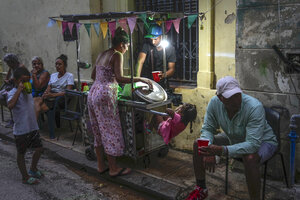The light in Cuba
An acute electricity crisis in the island nation may be stirring accountability and transparency.

A woman buys soup from a street vendor during a power outage in Havana, Cuba, Oct. 21.
AP
In Cuba, blackouts may be bringing light. The island’s power grid has collapsed at least four times in October, plunging the country into darkness. Even under the best conditions, electricity reaches only parts of the population for a few hours at a time.
President Miguel Díaz-Canel declared a state of emergency and blamed the crisis on Washington’s long-standing economic embargo. But even his most senior aides no longer trust that old excuse to placate frustrated citizens.
On Tuesday, the ruling Communist Party fired the vice prime minister in an anti-corruption probe into private business. Several days earlier, Vice President Manuel Marrero Cruz openly contradicted his boss, ascribing the outages – a “complex” situation, he called it – primarily to dilapidated energy infrastructure.
Such rays of transparency may seem at odds with a government hobbled by corruption and criticized for jailing its opponents. Yet that reputation obscures gradual reforms to meet the rising demands of a new and entrepreneurial generation, such as legalization of privately owned businesses.
“With the new circumstances, more honesty has found its way into all areas of the economic debate,” wrote Marcel Kunzmann, a Cuba expert at the University of Buckingham, in a paper published in May. Although most workers still work for the state, he noted, the expectations of ordinary citizens have shifted. “If anything can be said about the young generation in Cuba, it is that we are workers,” a young woman told him.
Honesty has lately helped another country confront its own persistent energy crisis. Since roughly 2007, South Africans have endured rolling brownouts to cope with rising demand on an aging, publicly owned power grid never designed to meet the needs of the full population. Efforts to overhaul the system were beset by deepening corruption. Last year, President Cyril Ramaphosa was forced to declare the power cuts a national emergency.
But the formation of a new coalition government following elections in May that ended three decades of one-party rule has already brought change. A new law signed in August maps an end to the state’s monopoly on power generation. Democratizing the grid, Mr. Ramaphosa said, will boost competition and a shift toward renewable energy sources.
Oil fuels 80% of Cuba’s energy production. In March, during a previous round of acute power shortages, only one of the country’s three refineries was functional. Protests broke out in several cities over “freedom, food, and electricity.” Nearly 5% of the population has emigrated since 2021.
The government’s attempt “year after year to explain the situation and affirm that ‘they are working to resolve it’ are not well received by a large part of the population, tired and worn out by the difficulty of sustaining life in Cuba with a minimum of well-being,” the news blog La Joven Cuba observed.
Some officials might now be listening. Out of the darkness, their honesty shines new light.

